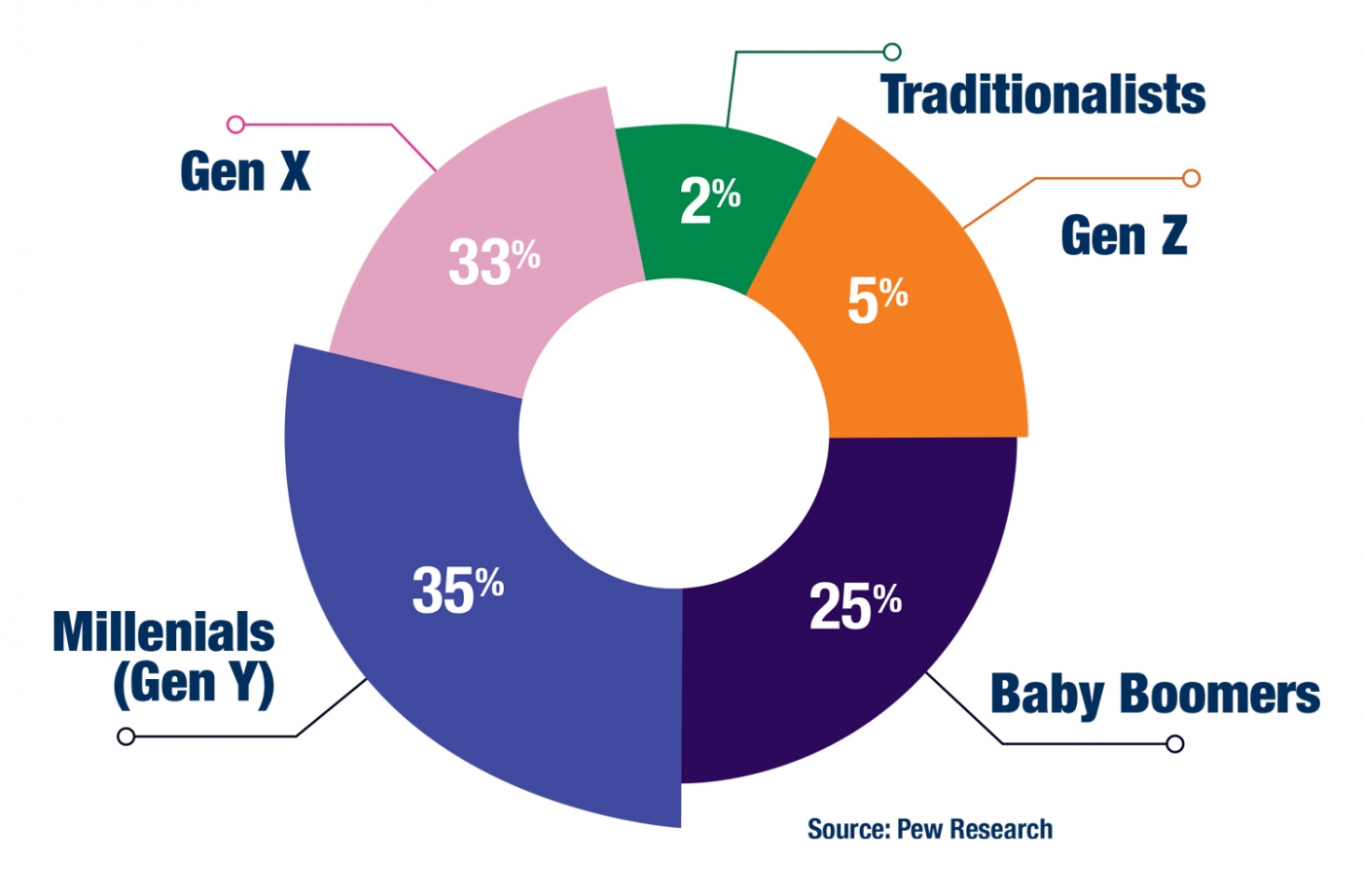This is the first installment of our two-part series on Navigating the Multigenerational Workplace. We'll explore the characteristics of each generation, highlight their similarities and differences, and guidance for employers on how to support and leverage the unique strengths of each generation in the workplace. Next month, we'll bring you the second part of this series, where we explore the commonalities that bind us together, regardless of age.
Bridging the Gap Between Five Generations
It’s a long-standing joke that every generation is suspicious of the one coming after it, while rolling its eyes at those who came before. And, of course, there are stereotypes galore: Boomers are terrible with tech. Gen Xers hate everything. Millennials are entitled. And Gen Z is lazy.
But when it comes to engaging a multigenerational workforce, leaders must toss those jokes and stereotypes aside. There are now five generations in the workforce simultaneously (Gen Z, Millennials, Gen X, Baby Boomers, and some members of the Silent Generation still working in their late 70s and early 80s) – a first in modern history. This means an employer today could easily have young graduates working side-by-side with great-grandparents.
While some may argue that these generations are worlds apart, research from McKinsey & Company suggests that employees of all ages seem to want the same things from their work experience—with a few important caveats. In this blog, we'll explore the characteristics of each generation, highlight their similarities and differences, and discuss strategies for fostering collaboration among them.
Traditionalists (Silent Generation) - Born: 1925–1945
- Shaped by: the Great Depression, World War II, radio, and movies.
- Characteristics: practical, dependable, and value stability.
- Work style: Traditionalists value seniority, respect, and rules due to the hierarchical structures of their era, often remaining loyal to a single company throughout their careers.
- Communication style: face-to-face, handwritten notes instead of email.
- What employers can do to support them: Most Traditionalists are retired (or work as board members), their work ethic, strong sense of responsibility, and communication style have influenced the Baby Boomers.
Baby Boomers - Born: 1946–1964
- Shaped by: Vietnam War, Cold War, Civil Rights Movement, and Watergate.
- Characteristics: optimistic, workaholic, team-oriented,
- duty-bound, loyal, and success-driven.
- Work style: Baby Boomers value teamwork and individual accomplishments. They seek recognition for their efforts and prioritize long-term company value.
- Communication style: Face-to-face and phone calls are preferred, but email is also widely accepted.
- What employers can do to support them: Provide opportunities for them to prove themselves, acknowledge their contributions, and put them in mentor roles.
Generation X - Born: 1965–1980
- Shaped by: the AIDs epidemic, Cold War, and dot-com bubble.
- Characteristics: independent, adaptable, and self-reliant; value personal life over company profits.
- Work style: Gen Xers like working independently and may switch jobs if their needs aren’t met. They also seek fair pay, compensation for extra work, and skill-building opportunities.
- Communication style: Email is preferred, but face-to-face and phone calls are also widely used.
- What employers can do to support them: Provide immediate feedback, flexibility, and a work-life balance, as well as offer professional development opportunities and coaching.
Millennials (Generation Y) - Born: 1981 - 2000
- Shaped by: Columbine, 9/11, Iraq War, Afghanistan War, and the rise of the Internet.
- Characteristics: purpose-driven, tech-savvy, and civic-minded; will switch jobs if their work-life balance suffers.
- Work style: Millennials value meaningful work, great managers, teamwork, challenges, flexibility, and work-life balance.
- Communication style: instant messaging, texting, and email.
- What employers can do to support them: Get to know them personally, manage by results, provide immediate feedback, and offer flexible work.
Generation Z - Born: 2001–2020
- Shaped by: global recessions, the rise of social media, the COVID-19 pandemic, and access to technology from a young age.
- Characteristics: purpose-driven, independent, and self-aware; value personalization, individuality, creativity, and diversity and inclusion.
- Work style: Gen Zers value job stability and individual recognition. They’re also educated and principled, opting to leave companies that don’t align with their personal values.
- Communication style: instant messaging, texting, and social media.


